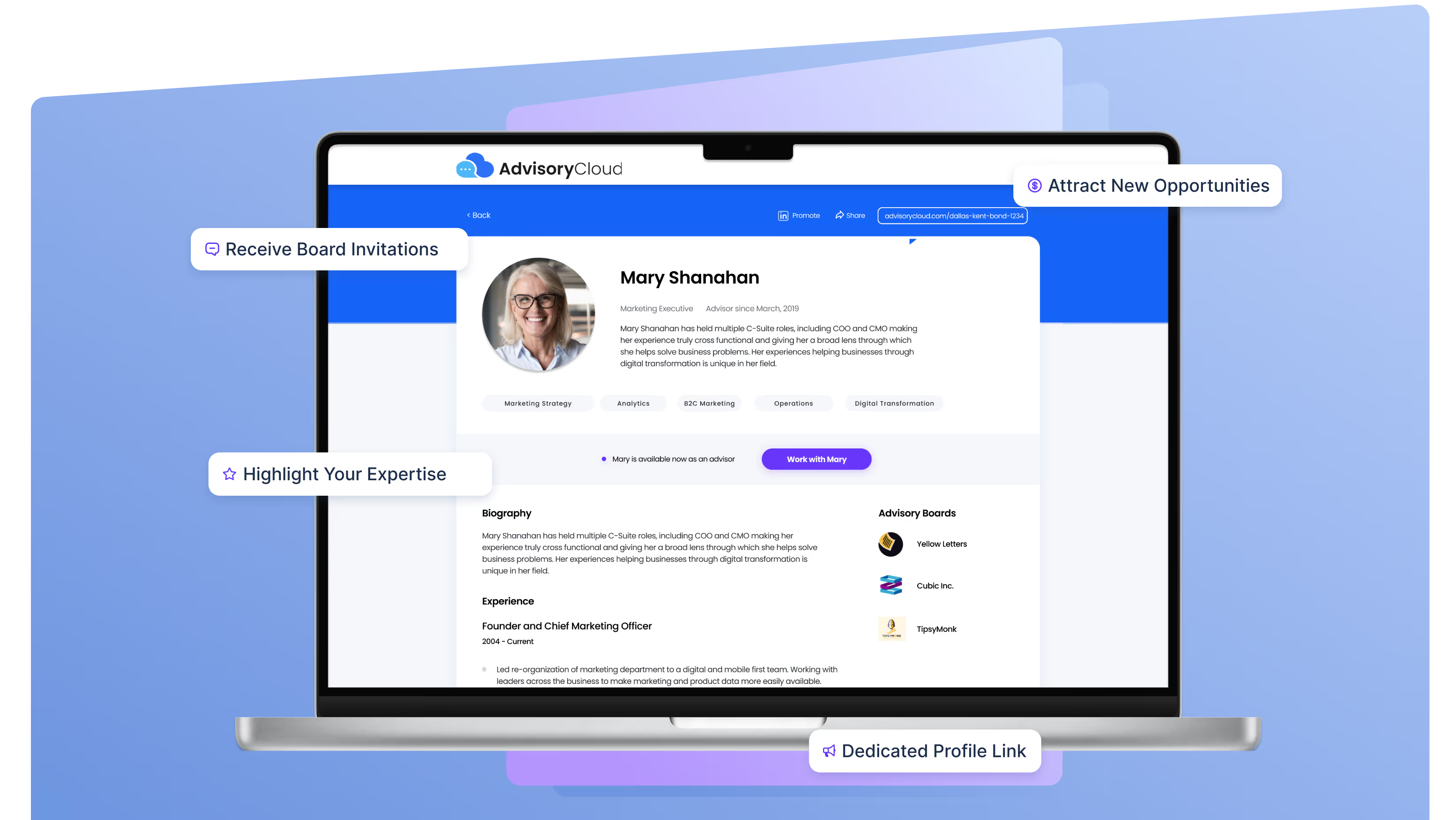August 8, 2023

Choosing the right mentor can be a game-changer in your personal and professional development journey. A mentor is someone who guides and supports you, sharing their knowledge and experience to help you grow and achieve your goals. In this comprehensive guide, we will explore the importance of having a mentor, how to identify your mentorship needs, finding potential mentors, evaluating them, and building a successful mentor-mentee relationship. Whether you're just starting your career or looking to take it to the next level, this guide will equip you with the necessary tools to choose the right mentor for you.
Understanding the Importance of a Mentor
A mentor plays a crucial role in personal development. They offer guidance, expertise, and perspective that can accelerate your growth. A mentor serves as a trusted advisor, helping you navigate challenges, providing constructive feedback, and sharing valuable insights. With a mentor by your side, you can gain clarity, avoid common pitfalls, and tap into their network, opening doors to new opportunities.
But what exactly does it mean to have a mentor? Let's delve deeper into the role of a mentor in personal development and explore how they can positively impact your life.
The Role of a Mentor in Personal Development
Having a mentor can greatly impact your personal development. They can challenge you to step out of your comfort zone and encourage you to explore new ideas and possibilities. A mentor acts as a sounding board, helping you think through decisions and offering valuable advice based on their own experiences. Their wisdom can provide you with a fresh perspective, inspiring you to overcome obstacles and achieve your full potential.
Imagine this scenario: you're at a crossroads in your life, unsure of which path to take. A mentor can be the guiding light that helps you find your way. They can share their own stories of triumph and failure, giving you the confidence to take risks and pursue your dreams. With their guidance, you can develop a clear vision for your future and set meaningful goals that align with your values and aspirations.
Furthermore, a mentor can provide you with valuable feedback and constructive criticism. They can help you identify your strengths and weaknesses, allowing you to focus on areas that need improvement. By addressing these areas, you can develop new skills and enhance your personal growth. A mentor's guidance can also help you navigate the complexities of relationships, both personal and professional, enabling you to build strong connections and thrive in various social settings.
How a Mentor Can Boost Your Career
A mentor can be a career game-changer. They can provide guidance on career planning, help you set realistic goals, and offer strategies to navigate the complexities of the professional world. With a mentor's support, you can develop essential skills, expand your professional network, and gain access to opportunities that may otherwise be out of reach. Their experience and expertise can accelerate your career growth and help you make informed decisions.
Picture this: you're a young professional, eager to climb the corporate ladder. Without a mentor, you might find yourself feeling lost and overwhelmed. However, with the guidance of a mentor, you can gain valuable insights into the industry, learn about potential career paths, and discover the skills and qualifications needed to succeed. A mentor can introduce you to influential individuals in your field, providing you with networking opportunities that can open doors to new job prospects and collaborations.
Moreover, a mentor can help you develop a strong personal brand and professional reputation. They can offer advice on how to present yourself in interviews, how to effectively communicate your ideas, and how to navigate office politics. By honing these skills, you can position yourself as a valuable asset within your organization and increase your chances of advancement.
It's important to note that a mentor is not a substitute for hard work and dedication. While they can provide guidance and support, it is ultimately up to you to put in the effort and take action. A mentor can offer valuable insights and advice, but it is your responsibility to apply that knowledge and make the necessary changes in your life.
In conclusion, having a mentor can be a transformative experience. They can provide you with the guidance, support, and perspective needed to accelerate your personal growth and boost your career. By leveraging their wisdom and expertise, you can navigate challenges with confidence, make informed decisions, and achieve your full potential. So, if you have the opportunity to find a mentor, seize it. Your future self will thank you.
Identifying Your Mentorship Needs
Before embarking on your mentorship journey, it is crucial to assess your career goals, strengths, and weaknesses. Understanding your mentorship needs will help you find a mentor who aligns with your objectives and can provide the guidance you require.
Mentorship is a powerful tool that can propel your career forward. However, in order to make the most out of this experience, it is essential to have a clear understanding of your career goals. Take the time to reflect on your long-term aspirations and where you envision yourself in the future. Are you looking to climb the corporate ladder? Do you want to become an industry expert in a specific field? By defining your goals, you can better identify the type of mentor who can help you achieve them.
Assessing Your Career Goals
Take the time to reflect on your long-term career aspirations. Identify the areas where you want to grow and the skills you need to develop. A mentor can help you bridge the gap between where you are now and where you want to be. By aligning your goals with a mentor's expertise, you can ensure that your mentorship experience is focused and impactful.
For example, if your goal is to become a successful entrepreneur, look for a mentor who has a proven track record in starting and scaling businesses. Their experience and insights can provide invaluable guidance as you navigate the challenges of entrepreneurship.
On the other hand, if your goal is to advance in your current career path, seek out a mentor who has excelled in the same industry or role. They can share their knowledge and help you develop the skills necessary to reach the next level.
Identifying Your Strengths and Weaknesses
Self-awareness is key to finding the right mentor. Take an honest inventory of your strengths and weaknesses. Be open to feedback and identify the areas where you need guidance and support. Finding a mentor who complements your skillset and can help you overcome your weaknesses can have a profound impact on your growth.
For instance, if you excel in technical skills but struggle with public speaking, a mentor who is an effective communicator can provide you with strategies to improve your presentation skills. By addressing your weaknesses head-on, you can become a more well-rounded professional.
Moreover, a mentor can also help you leverage your strengths. They can guide you on how to capitalize on your unique abilities and use them to your advantage. By understanding your strengths, you can better position yourself for success and find opportunities that align with your abilities.
Remember, mentorship is a two-way street. While it is important to identify your mentorship needs, it is equally important to be open to learning from your mentor. Be receptive to their feedback and guidance, and actively seek opportunities to apply their insights in your professional journey.
Finding Potential Mentors
Once you have a clear understanding of your mentorship needs, it's time to find potential mentors who can provide the guidance you seek.
But where do you start? How can you find the right mentors who can help you grow and achieve your goals? Let's explore some strategies that can help you in your search.
Utilizing Your Existing Network
One of the best places to start your search for potential mentors is within your existing network. Look around you and identify individuals who have achieved success in your field or have the expertise you desire.
Reach out to colleagues, friends, or former professors who may be able to connect you with potential mentors. They might know someone who can provide the guidance and support you need. Don't hesitate to ask for introductions or recommendations.
Additionally, consider leveraging online networking platforms like AdvisoryCloud.com. These platforms can be a valuable resource to find mentors within your industry or area of interest. They provide a platform where you can connect with experienced professionals who are willing to share their knowledge and insights.
Seeking Mentors in Professional Organizations
Another great avenue for finding mentors is through professional organizations and industry associations. Many of these organizations have mentorship programs or resources specifically designed to connect mentees with experienced professionals.
Joining these organizations not only gives you access to a vast network of professionals in your field but also provides you with opportunities to attend networking events. These events are an excellent way to meet potential mentors face-to-face and establish meaningful connections.
When attending these events, make sure to come prepared with questions and a clear idea of what you're looking for in a mentor. This will help you engage in meaningful conversations and make a lasting impression.
Remember, finding the right mentor is not about simply ticking off a box. It's about building a relationship based on trust, mutual respect, and shared goals. Take your time, do your research, and be proactive in reaching out to potential mentors. The right mentor can make a significant difference in your personal and professional growth.
Evaluating Potential Mentors
Once you have identified potential mentors, it is essential to evaluate their suitability for your mentorship needs. Not all mentors are created equal, and it is crucial to find someone who aligns with your goals and values.
When evaluating potential mentors, there are several factors to consider. One important aspect is checking the mentor's background and experience. It is vital to research the potential mentor's background thoroughly. Look for mentors who have achieved the success you aspire to or have expertise in the areas you wish to develop. This research will give you valuable insights into their professional journey and accomplishments.
Furthermore, verifying their credentials and assessing their track record is crucial. By doing so, you can gain confidence that the mentor has the necessary knowledge and experience to guide you effectively. Evaluating their past achievements and experiences will help you determine if they are the right fit for your mentorship goals.
In addition to evaluating the mentor's background and experience, it is equally important to assess their communication style. Effective communication is paramount in a mentor-mentee relationship, as it sets the foundation for a productive and meaningful connection. During your initial interactions with potential mentors, pay close attention to their communication style.
Ask yourself if they are receptive to questions and open to dialogue. Do they actively listen and provide constructive feedback? These are essential qualities to look for in a mentor. A mentor who communicates clearly, listens attentively, and encourages open dialogue will create an environment that fosters growth and development.
Remember, a mentor-mentee relationship thrives on effective communication. It is through open and honest conversations that you can learn from their experiences, gain valuable insights, and receive guidance on your journey towards success.
Approaching Potential Mentors
Once you have evaluated potential mentors and found the right fit, it's time to approach them confidently. Building a strong mentorship relationship can be a valuable asset in your personal and professional development.
When reaching out to a potential mentor, it is crucial to be clear and concise about why you want them as a mentor and how you believe their expertise can benefit you. Demonstrating your commitment to personal growth and a willingness to invest time and effort in the mentorship relationship can make a strong impression.
Personalizing your communication is key to showing that you have done your research and are genuinely interested in working with them. Mention specific accomplishments or experiences of the potential mentor that resonate with you and explain why you believe they would be a great fit.
How to Initiate Contact with a Potential Mentor
When initiating contact with a potential mentor, there are several approaches you can take. One option is to send an introductory email, briefly introducing yourself and expressing your interest in their mentorship. In this email, be sure to clearly articulate why you believe they are the right mentor for you and how their guidance can contribute to your growth.
Another approach is to request a meeting in person or via video call. This allows for a more personal connection and gives you the opportunity to convey your enthusiasm and dedication directly. When requesting a meeting, be respectful of their time and availability. Offer a few options for meeting times and be flexible in accommodating their schedule.
Preparing for the First Meeting
Prior to your first meeting with a potential mentor, it is essential to come prepared. Take the time to research their background, accomplishments, and areas of expertise. This will help you formulate thoughtful questions and topics for discussion.
Create a list of questions or areas you would like to cover during the meeting. This will ensure that you make the most of your time together and demonstrate your proactive approach to learning from their insights. Consider asking about their career journey, challenges they have faced, and how they have overcome obstacles.
Respect their time by being punctual for the meeting. Arriving a few minutes early shows your professionalism and dedication. Additionally, bring any relevant materials or documents that you believe may be helpful for the discussion. This could include your resume, portfolio, or any specific projects you would like to receive feedback on.
During the meeting, actively listen to their advice and guidance. Be open and receptive to their feedback, even if it may be challenging to hear. Remember that their insights are valuable and can contribute to your growth. Show gratitude for their time and insights, expressing your enthusiasm for the potential mentorship.
Building a strong mentorship relationship requires effort and commitment from both parties. By approaching potential mentors confidently and preparing for your interactions, you increase the likelihood of establishing a successful and beneficial mentorship.
Building a Successful Mentor-Mentee Relationship
Once you have established a mentor-mentee relationship, it's important to foster a strong connection built on trust and mutual respect.
Setting Clear Expectations
Clarify your expectations with your mentor from the beginning. Discuss your goals, desired frequency of meetings, and the type of support you are seeking. Clear expectations provide a foundation for a productive mentorship and ensure that both parties are aligned and committed.
Maintaining Regular Communication
Regular communication is key to a successful mentor-mentee relationship. Schedule regular check-ins with your mentor to discuss your progress, seek guidance, and share any challenges you may be facing. Be proactive in reaching out to your mentor, keeping them updated on your achievements and seeking their input on your growth journey.
Tips for a Successful Mentorship
To maximize the benefits of your mentorship, keep the following tips in mind throughout your mentorship journey:
Being Open and Receptive to Feedback
Stay open-minded and receptive to feedback from your mentor. Embrace constructive criticism as an opportunity for growth and improvement. Actively seek their perspective and consider their advice carefully. Your mentor's feedback can help you identify blind spots and develop the skills necessary for success.
Taking Initiative in Your Own Growth
Mentorship is a two-way street. Take initiative and ownership of your own growth. Set goals for yourself and take action to achieve them. Seek resources and opportunities for learning and skill development. A proactive attitude demonstrates your commitment to personal and professional growth, making your mentor-mentee relationship more impactful.
Conclusion: The Impact of the Right Mentor on Your Career Path
Choosing the right mentor can have a profound impact on your career path. A mentor can provide guidance, support, and valuable insights that can accelerate your growth and open doors to opportunities.
Remember to be intentional in your search for a mentor, identifying your specific mentorship needs and evaluating potential mentors based on their background, experience, and communication style. Maintain open and regular communication with your mentor, actively seeking their guidance and taking ownership of your own growth. A successful mentor-mentee relationship can propel your career to new heights, leading to personal and professional fulfillment.
For additional resources and opportunities to connect with mentors, consider exploring platforms like AdvisoryCloud.com. These platforms provide virtual advisory boards and networking opportunities that can further enhance your mentorship journey and support your growth, especially in startups where engaging with experienced professionals can be highly beneficial.
See what boards you match with.
See what you qualify for with our 2-minute assessment.


Similar Articles

August 20, 2025
What every CIO needs to do in their first 100 days.
August 20, 2025
The Top 10 Mistakes that CEOs Make
August 20, 2025
The 8 Qualities of high performing CEOs
August 20, 2025
Setting Non-Financial Goals for Career Success
August 20, 2025
How to become a business advisor as a VP of Marketing
August 20, 2025
How to Become a Board Member: A Step by Step Guide
August 20, 2025
How networking with your executive peers will help you grow.
August 20, 2025
Do You Need a Sponsor or Mentor to Advance Your Career?
August 20, 2025
Achieving Tech Career Goals for Mid-Career Professionals
August 20, 2025
5 Ways to develop as a leader in your role.






